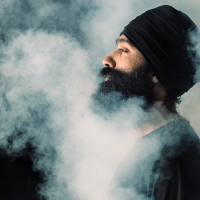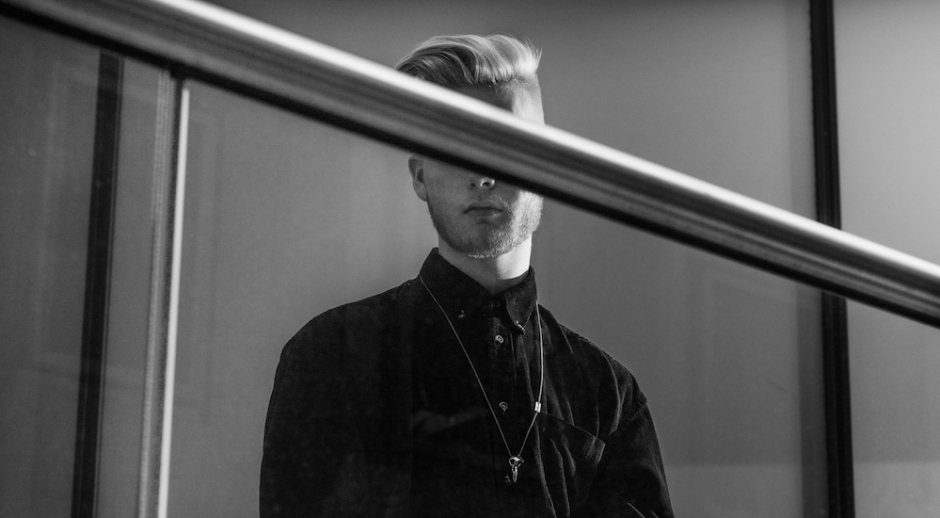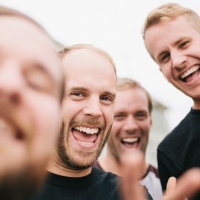 The Process of Becoming With L-FRESH The Lion“Hip hop spoke to a part of me that wasn’t being spoken to.”
The Process of Becoming With L-FRESH The Lion“Hip hop spoke to a part of me that wasn’t being spoken to.”

Mura Masa Is The Future
Falling in love with one of the world's most exciting electronic acts.
If there’s such a thing at love at first listen, it only takes a few bars of a Mura Masa track to fall fast:
If you just played that ^ and you’re thinking to yourself, ‘I’m hip, I’m up to date with new music, how have I not heard this yet?!’, don’t stress, you’re not losing your edge. Mura Masa’s transition from a bedroom operator uploading links to his Soundcloud and watching YouTube studio production DIYs from an isolated island in the English Channel, to a familiar presence on British contemporary - and now, Australian - radio waves, has all happened in under six months.
To wit: at the end of 2015, 19 year-old Alex Crossan uploaded a mixtape of beats – Soundtrack To A Death – and BBC played it on Radio 2, before it went straight to Album of the Week on Radio 1. An orchestral-leaning, left-field electronic-pop ballad Love For That, featuring singer Shura, then found its way onto BBC’s popular 1Xtra playlist after being played more than a million times on SoundCloud, which eventually led to Mura Masa scoring a coveted spot in BBC’s taste-making ‘Sound of 2016’ Music Chart (he tied with WSTRN) in January, at which point the majors came running. He’s got an EP out now, Someday Somewhere, has been asked to remix Ellie Goulding and Ed Sheeran, and Diplo and Skrillex number among his fans.
The attention is warranted. In the words of MixMag, this kid is “terrifyingly talented” - his deft combination of heartfelt lyrics, glitchy-tropical electronic beats and his broad spectrum of instrument usage (Asian flutes, even, the parts for which Crossan writes himself, because he’s one of those plays-every-instrument geniuses) definitely made his work stand out amongst the more homogenous electronic productions out there right now. The producer self-describes his style as: “taking everything I love about hip hop and electronic music and mashing it together in the setting of lo-fi, oriental-influenced beat music”.
Mura Masa now has a debut album underway, and, according to his agency, it will be a “complete creative statement, not designed by committee - like his early inspiration, James Blake.” Seeing as though we’re at that point now where James Blake has gotten to sounding, well, ‘James Blakey’ – we could certainly do with someone like Mura Masa to drum up that kind of ‘this is the new new’ excitement that was in the air when Limit To Your Love first had us at hello.
Here’s the man himself, anyway, in his own words:
On scoring the #5 spot in the BBC Music’s “Sound of 2016” List & BBC’s power to make a young musician’s career skyrocket:
I think as far as music institutions go, BBC Radio 1 is unparalleled. There’s no more powerful platform for new music over here, it’s proved itself time and time again.
I remember the first time I went into the BBC for an interview… I was really nervous. I met Annie Mac [BBC radio host] and she was lovely, so it was all fine. I still have my Day Pass lanyard for the BBC Studio – I kept my very first one so I’ll never forget how exciting that day was for me!

On his punk rock past and playing in Guernsey pubs as a teenager:
I used to be in a lot of punk and garage rock bands when I was growing up in Guernsey [an island in the English Channel]. My favourite was probably this trashy, punk-metal band So Called The River. I was 14, 15 at the time, and everyone else in the band was in their mid-20s, so they were a lot older than me, which was super cool for me being around them, I learnt heaps about music and we used to play gigs in pubs in town. I wasn’t technically old enough to be let in - but Guernsey’s a small, tight-knit community of people – they tend to turn the other cheek when it comes to underage drinking!
On living in Brighton, and what ‘music scene’ he currently identifies with:
The best way I could describe Brighton, where I’m currently living, is that it’s like a London, but on the sea. Very relaxed, trendy, cultural. It’s a cool place. Brighton tends to have a lot of indie-rock and punk music, that kind of thing. There’s a big reggae scene here as well. However, I don’t really spend that much time here as I’m always touring around, and in London a lot, doing meetings, and in studios. Actually, I’d say I feel more a part of the London music scene than the Brighton one.
On the importance of making music with real instruments:
I think for music to stand the test of time and be considered important it has to be crafted really well, and in a culturally relevant way. With my recordings, I tend to score parts for instruments out on the computer and then record them, by playing instruments myself, in a studio. I think it’s something that’s an important part of my sound, and hopefully sets me apart.
At gigs, I don’t have a band onstage with me, but I try and hop around from instrument to instrument myself. I do a little bit of drumming live, and sing, and play keyboard, there’s even a bit of guitar in there [Crossan is a self-taught guitarist and violinist]. I’ve got this girl Bonzai who sings with me as well. Or if we’re in London, and NAO or Denai Moore [Mura Masa’s female vocal collaborators] are around, they’ll come along and do their bits.
On growing up ‘on the Internet’, and the question of whether to delete early stuff as your profile grows:
People enjoy seeing the progressions in your music style I think, but it’s tempting to delete things you don’t want people to hear now your sound has developed – there’s a balance to be struck. I’ve left most of it up there, some stuff I’ve deleted. Like the very early dubstep (!) tracks I produced – one of them had a Robin Williams Good Morning Vietnam sample in it… awful. I’ve also deleted the first track I ever uploaded, it was called Death Grips, that was bad. That said, if people want to find things, they will! There’s also some terrible photos of me from when I was 17 or whatever, that don’t really reflect where I am now. That digital footprint is always going to be there. So that can be difficult.
On his video clips:
How amazing are the dancers in Love For That? We auditioned a bunch of dancers, then we had a whole day where we ran through the choreography. It was my idea that one, I wrote the treatment for it. Not really sure where the idea came from actually, it seemed to just kind of fit with the song. It made sense to play around with ideas of how you dance to electronic music, and young love.
I started working with this guy Yoni Lappin, on What If I Go – I think that’s more of an indication of where the aesthetic is heading - a realistic, DIY-ish, human feel. It’s a suburban London setting, it has this homely feel. [NB: The latest video, for What If I Go, is shot on square-format film, and follows young couples around Hackney – through clubs, takeaway shops, housing estates].
On the themes driving his upcoming debut album:
The next release is called To Fall Out Of Love To – it’s kind of like a coming of age record. Since the last release, I dropped out of my English Literature degree at Sussex Uni to do music full time, and moved away from home, so it’s all based around that.
The online music collectives that have influenced and shaped his sound, and on starting his own label:
I grew up pretty isolated in Guernsey, which isn’t exactly the throbbing heart of club music, so a lot of the music I heard was online, and I was open to more influences than I guess if I’d grown up in inner-London or whatever. One collective that’s been important to me is James Blake’s 1800 Dinosaur. Another one is LuckyMe; Lunice, S-Type, Hudson Mohawke, TNGHT, their stuff first exposed me to exciting electronic-based bedroom producer style stuff.
I’ve also just started my own little label, Anchor Point, and we’re trying to create our own little scene, our own creative space [Head HERE to free download AP Sound, a mixtape of Mura Masa bootlegs and demos from artists signed to the Anchor Point label].
So far there’s a couple of artists on the label - the girl I mentioned, Bonzai, she’s the one who sings with me. She’s this Irish, punk R&B singer, she’s amazing. Having grown up with both genres, she brings D&B and R&B together in an authentic way. She’s right here, grinning at me [Click HERE to download Bonzai’s new EP, Sleepy Hungry].
There’s another act called Jadu Heart, they wear masks, and make Jai Paul-ish music, they’re mental.
It’s great being able to bring other acts on tour and use the exposure I’ve been getting to shine the attention onto other great artists. I’ve done some sessions with rappers, I won’t name and shame but one of them turned up with 12 people, he had his DJ, his tour manager, his merch guy… literally everyone he knew was with him in this studio, it was mental. Goals right, to get so big you can take every last pal from school on tour with you!
If you’re keen for more insight into the world of Mura Masa, the first part of a new documentary-series about the artist – helmed by What If I Go Director Yoni Lappin, aired yesterday. Watch below:
 The Process of Becoming With L-FRESH The Lion“Hip hop spoke to a part of me that wasn’t being spoken to.”
The Process of Becoming With L-FRESH The Lion“Hip hop spoke to a part of me that wasn’t being spoken to.”
 Luca Brasi And All They're Going To BeWe find out why Australia is falling head over heels for these Tassie punks.
Luca Brasi And All They're Going To BeWe find out why Australia is falling head over heels for these Tassie punks.